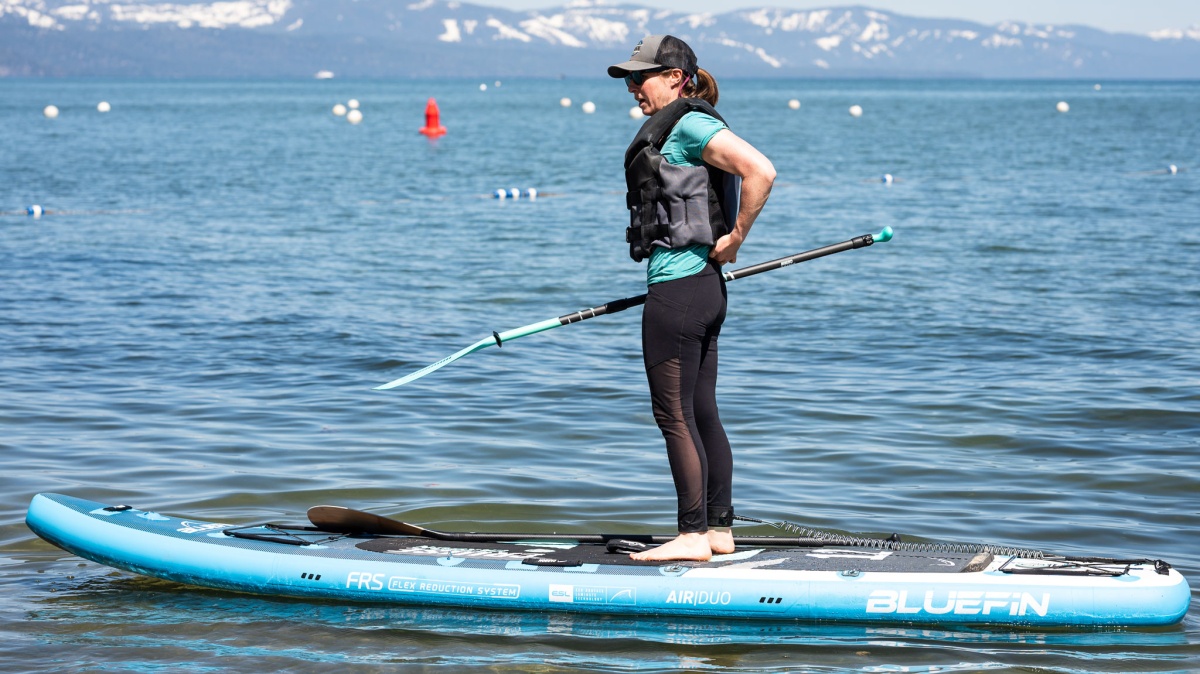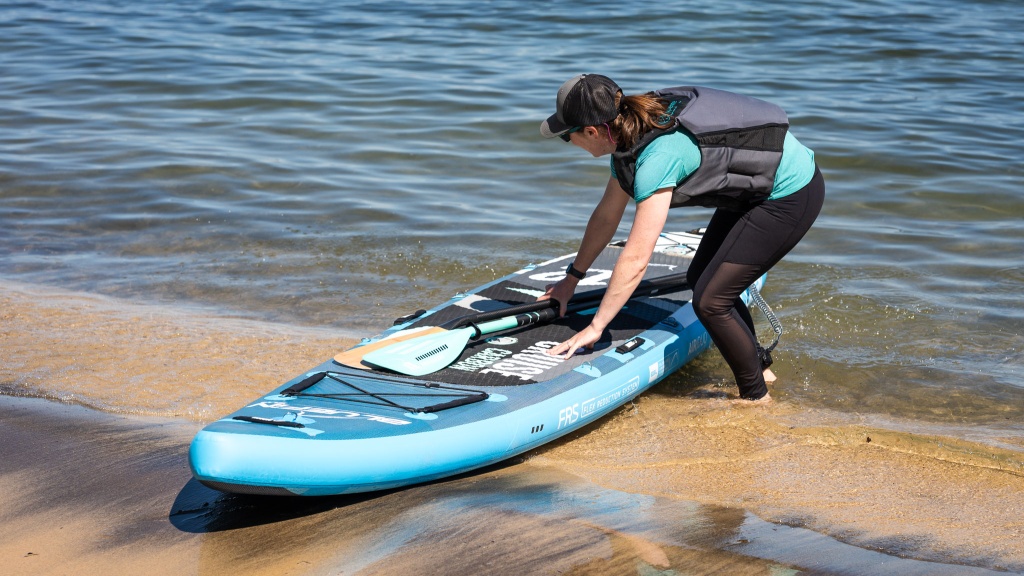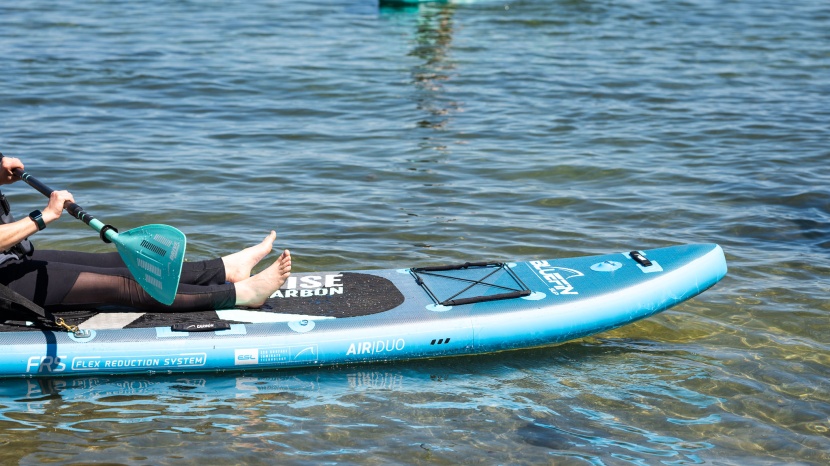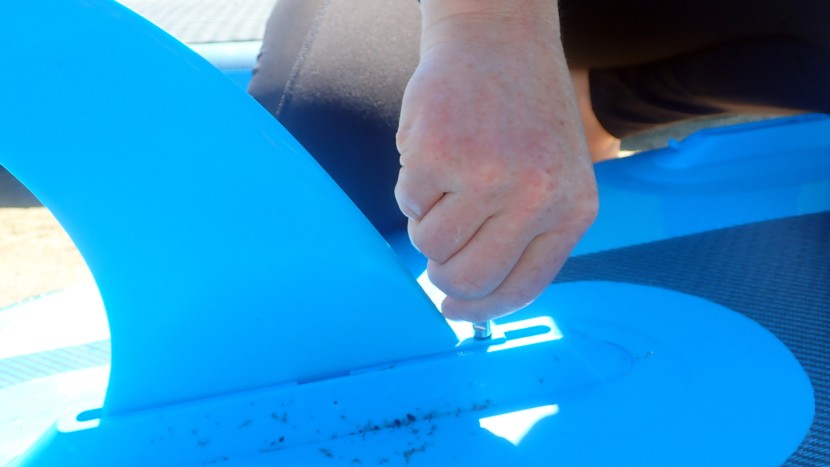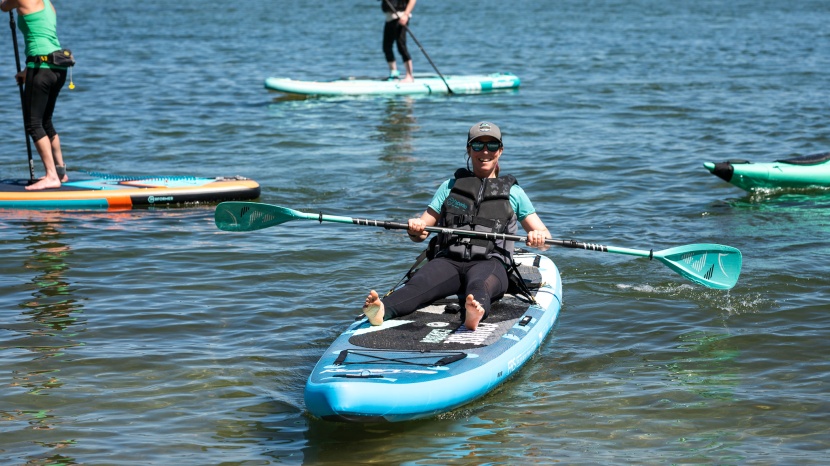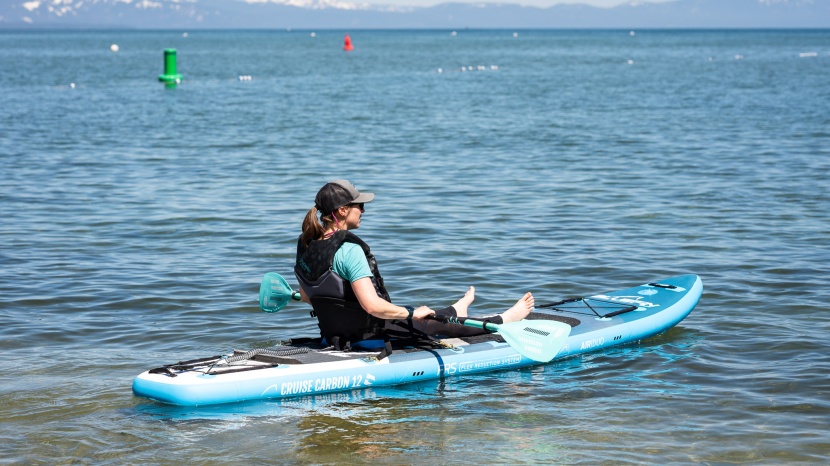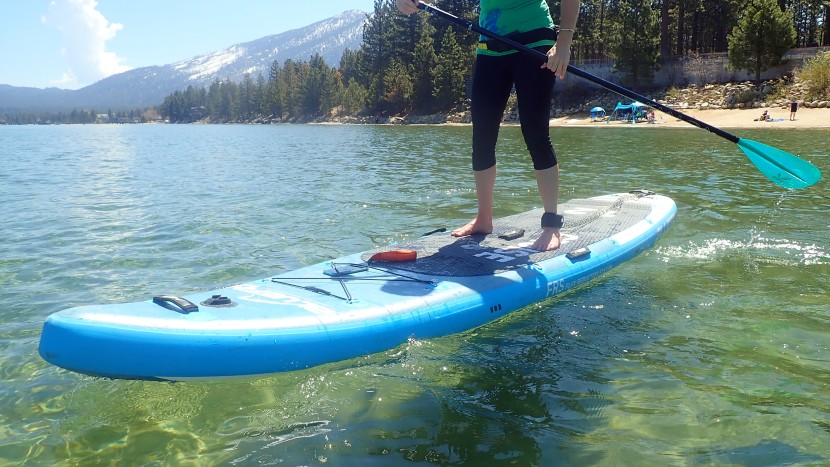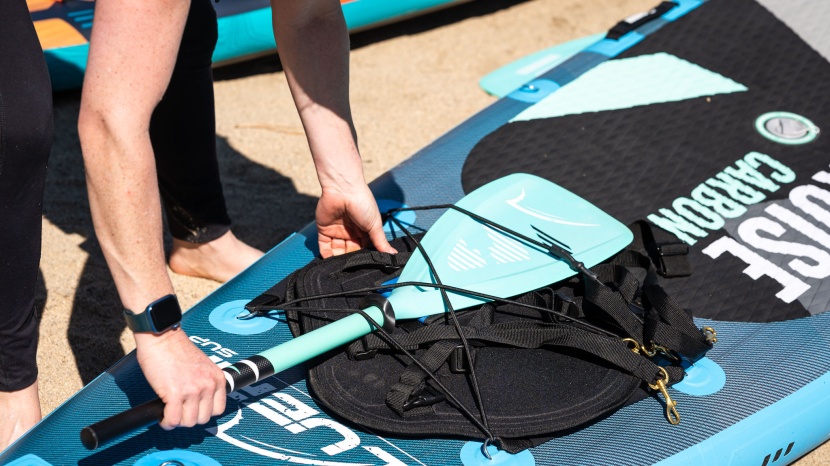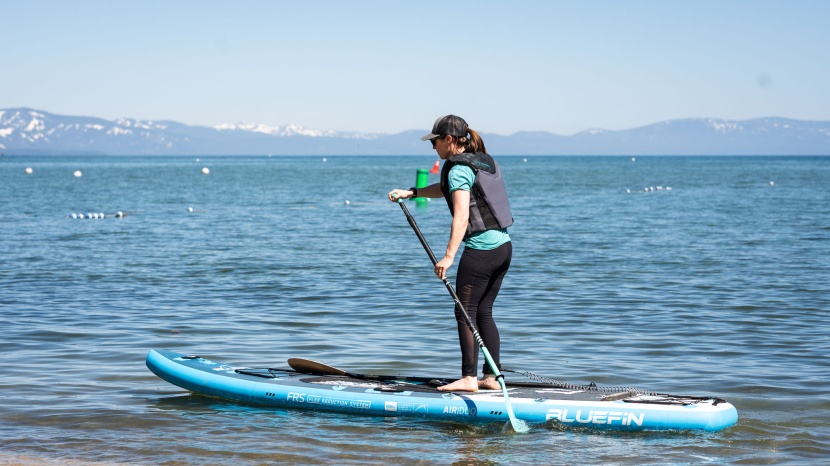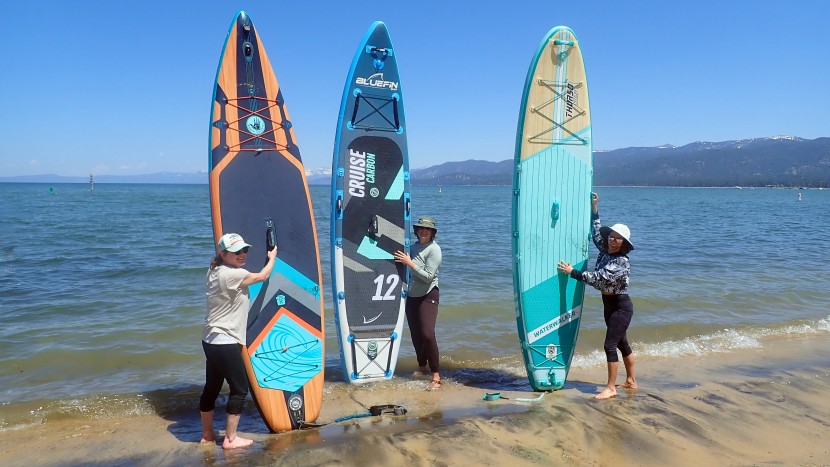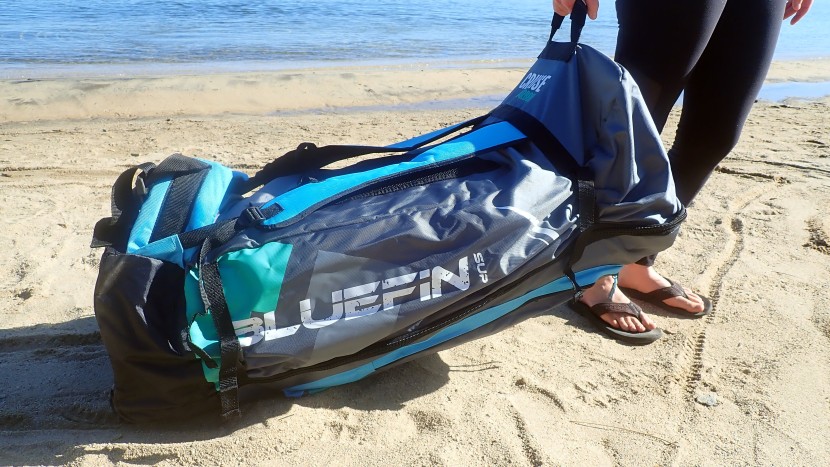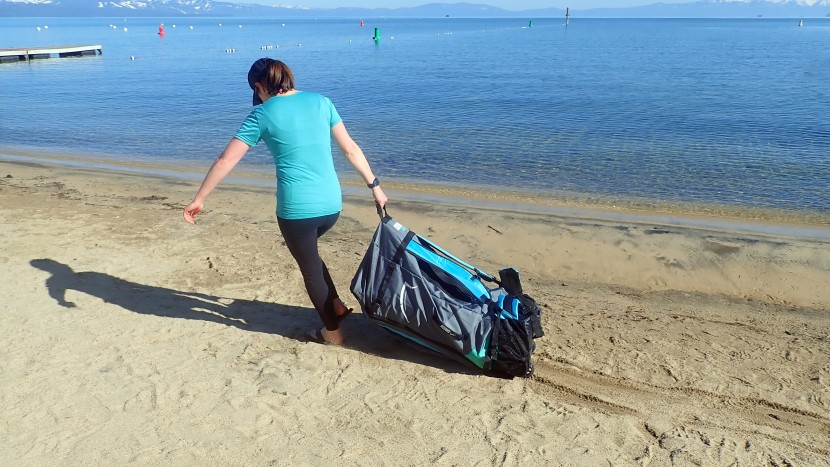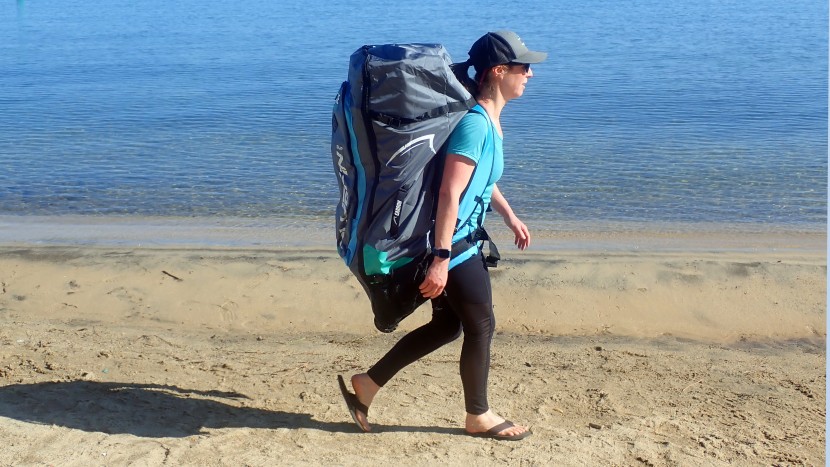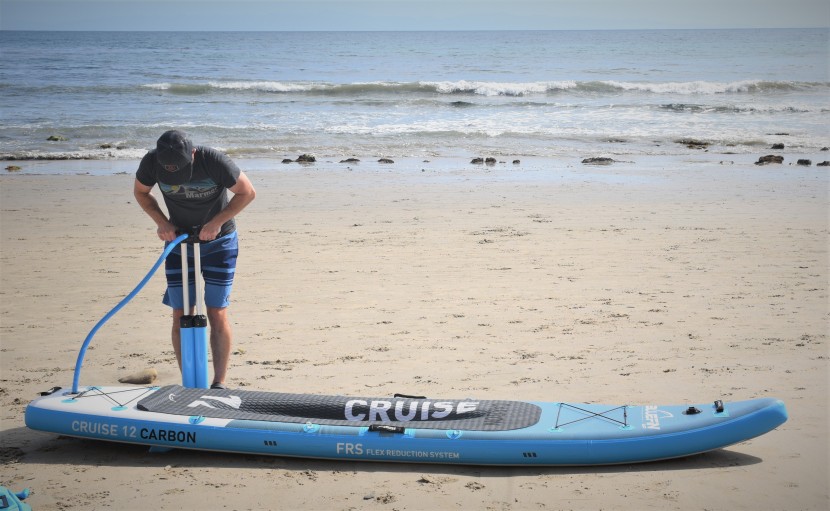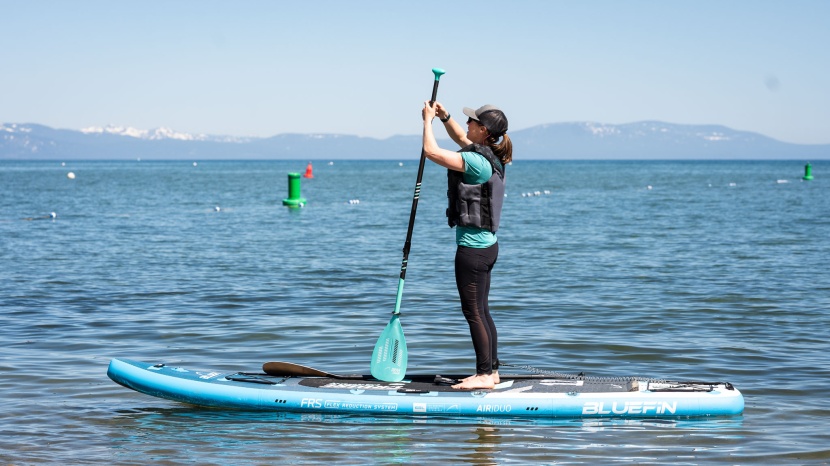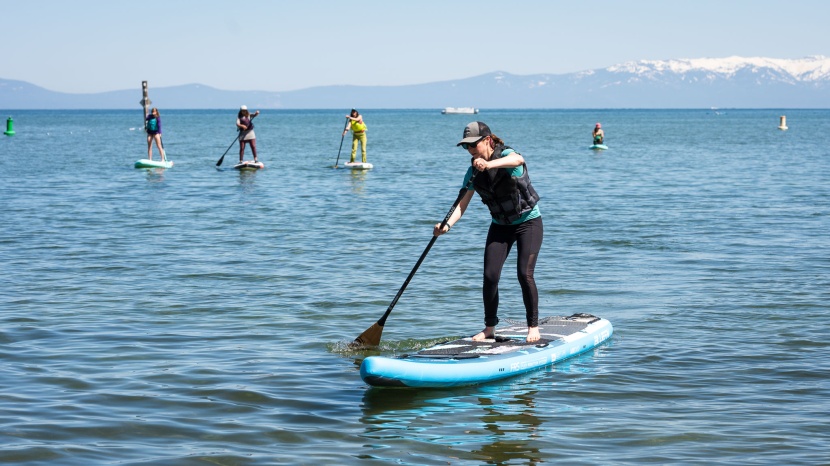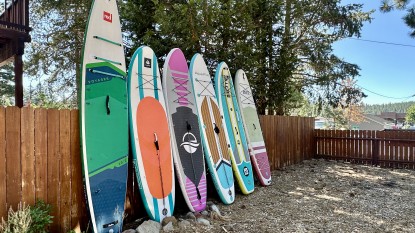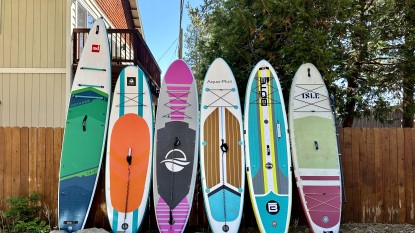
Our Verdict
Our Analysis and Test Results
The Cruise Carbon stands out for its impressive blend of glide and stability thanks to its rigid design. The quality build and construction are evident once you hit the water and feel how easily you can cut through waves and chop. The dual-chamber pump is one of the best we've tested, keeping your inflation effort reasonable for such a large board, and an impressive list of design features and accessories continues to place this board at the top of the class. There's even an included kayak seat and convertible paddle to add versatility. With so many features and an impressive paddling performance, the Cruise Carbon is in a category all its own. That said, the heavy-duty materials and construction make it far more challenging to haul around…
Stability
With its 12-foot x 32-inch x 6-inch dimensions, the Cruise Carbon 12 is one of the longer and higher-volume models in our lineup. These dimensions help it provide plenty of stability for most paddling conditions. The board maintains its 32-inch width along a good portion of its length with a gradual sidecut that tapers to a pointed nose and a squared-off tail. This provides more overall board volume and stability compared to other models with aggressive sidecuts that narrow from the waist more abruptly.
The board's rigidity is enhanced by a second inflation chamber underneath the deck pad and a carbon fiber Flex Reduction System (FRS) built into each side rail. These features combine with the board's larger overall size and weight to help withstand waves and chop better than most competitors. Other models have similar carbon fiber reinforcements to help enhance rigidity but lack the overall mass of the Cruise Carbon, which lessens the risk of being tossed around in rough waters. Our paddlers had no problem fighting through the choppiness during a windy day.
The three-fin setup with two smaller, permanently affixed side fins and one larger, removable center fin provides an ideal balance of glide performance and stability. Attaching the center fin can be tricky as the small screw must be lined up with a hole on the board.
Many new inflatable SUPs come with a kayak conversion kit. The paddle can be converted from an SUP paddle to a kayak paddle. The extra paddle blade, along with the included kayak seat, can be stowed onboard the vessel in either the front or rear cargo area and can be converted on the water as needed. This versatile design allows for the option to sit in the case of larger waves, or for tentative paddlers, where sitting down to paddle would be more comfortable or efficient. While this board includes a conversion kit, there are better options if this is a key factor when selecting a board.
Glide Performance
The length and enhanced rigidity, as well as touring-style geometry and a pointed, gradually rockered nose, allow the Cruise Carbon to slice through both calm and choppy water with relative ease. Although not as efficient as a true touring or racing-style board with a longer and narrower shape, this model outperforms most other competitors in this realm.
The built-in features that help enhance the rigidity of the Cruise Carbon help it glide through the water more efficiently. The second inflation chamber underneath the deck pad provides a stable platform for the rider to stand on, eliminating bending and flexing of the board that can absorb your paddling energy and rob you of your power and efficiency.
Similarly, the built-in Flex Reduction System (FRS) encases a carbon fiber layer along each side rail that enhances the stiffness of those edges. This allows the board to slice through the water more efficiently instead of absorbing lateral wave energy that can compromise your forward momentum.
One minor drawback that potentially reduces glide performance for the Cruise is that the included paddle is very flexible when used as a SUP paddle. Even though it has a carbon fiber shaft, it lacks the stiffness and rigidity of the top-ranked SUP paddles we tested. While this makes it more forgiving in difficult paddling conditions, it reduces overall power and efficiency. That said, most general users will be content with this paddle and will appreciate its versatility. Those looking to push this board to its highest performance capabilities may opt for a stiffer paddle to match the board's stiffness.
Maneuverability
This board's 12-foot length and gentle waist taper make it less nimble than other competitors. Its enhanced rigidity helps with efficient turning and reduces energy loss while maneuvering due to bending or flexing, but because it is so long, you have to give it time to come around.
Most SUP boards in our lineup see some kind of tradeoff between stability, glide performance, and maneuverability. Longer boards typically track in a straight line more naturally and maintain stability at speed, but their geometry makes it harder to make more precise movements. Likewise, shorter, nimbler boards are more agile and maneuverable but will likely sacrifice stability and speed.
Ease of Use
This is where the Cruise Carbon is lacking. Its heavy-duty materials and construction, second inflation chamber, and carbon-reinforced side rails add up to make this board a whopping 31 pounds. It is heavier than other boards in our lineup and one of the longest and widest boards we've tested. Its overall weight parallels some of the rigid fiberglass boards in the same size range. The carrying handles provide multiple options for gripping it, but smaller paddlers found it a struggle to transport.
The included carry bag is one of the largest and most awkward in our lineup. When packed full with the heavy board and all of the included accessories, the final weight is around 40 pounds. The straps can't be adjusted short enough for smaller folks either, and the bag size was almost equal to some of our paddlers! The additional handles are not very helpful, and the roller wheels are far too small for the bag's weight. While rolling, the top handle is in a location that allows the bottom of the bag to drag when pulling it across sand. We also found it challenging to squeeze all of the equipment inside, and the load is quite massive when fully packed. Because packing and carrying this bag is so much less convenient than most others, it's not a good choice for anyone who wants to travel with their board.
When fully inflated, the Cruise Carbon has five grab handles that offer options for hauling solo or with a partner. The handles are comfortably padded and well-placed for more ease while carrying. The front and back of the board features small cargo nets, the sides of which double as handles. There are also handles on each side of the board, parallel to the center one.
Even though it has two separate inflation chambers to help enhance rigidity, the Cruise Carbon inflates quickly thanks to its high-volume dual-chamber pump. Testers were able to inflate it to capacity in about 10 minutes. This pump is one of the best that we tested and has three different pumping options to help optimize power or efficiency.
While inflatable SUPs are more portable and convenient than rigid fiberglass boards, inflating them can be daunting and quite a workout. Improvements in pump design and efficiency continue to improve this process, and there are electric pumps available to assist with inflation. This part of the paddling experience is likely to be the most challenging aspect.
Construction Quality
Almost every other metric is affected by the build of a board, and the Cruise Carbon tops the list when it comes to construction quality. This board is built with a carbon-railing construction and dual inflation chambers to increase rigidity and stability on the water. To reduce the effects of the sun, Bluefin has added an Exo-Surface Laminate coated with a UV-protective layer.
Heat-welded bonds and the densest drop stitch pattern on the market are how Bluefin claims to increase durability. The double-layer side rails are reinforced with 500 denier PVC fabric and heat bonded. Unfortunately, our board's top chamber deflated while sitting overnight, inflated in a garage. While everything points to the Cruise being able to last, we were disappointed that this occurred after only a few uses in mild to moderate conditions. Despite this odd occurrence, we rated this board with high scores due to its overall build. We will report back if anything changes as we continue to use it.
Should You Buy the Bluefin Cruise Carbon?
The Cruise Carbon 12 is a quality board built of high-end materials, and the price reflects this. On the water, it offers excellent all-around performance, as well as the versatility of a kayak conversion. As a SUP board, it outperforms many similarly priced or more expensive models and easily outshines bargain-priced models with its higher-end materials, accessories, and performance. It's the only board we've tested that we'd put up against a solid board. Paddlers looking for a board that performs on the water will be pleased with the experience this one provides.
What Other Inflatable SUPs Should You Consider?
The Bluefin Cruise Carbon 12 is an impressive option with burly construction and versatile accessories that enhance its performance. But if the price is too high and you'd prefer something much lighter weight with great stability, the Bote Breeze Aero and theIsle Pioneer 3 are not to be missed.


